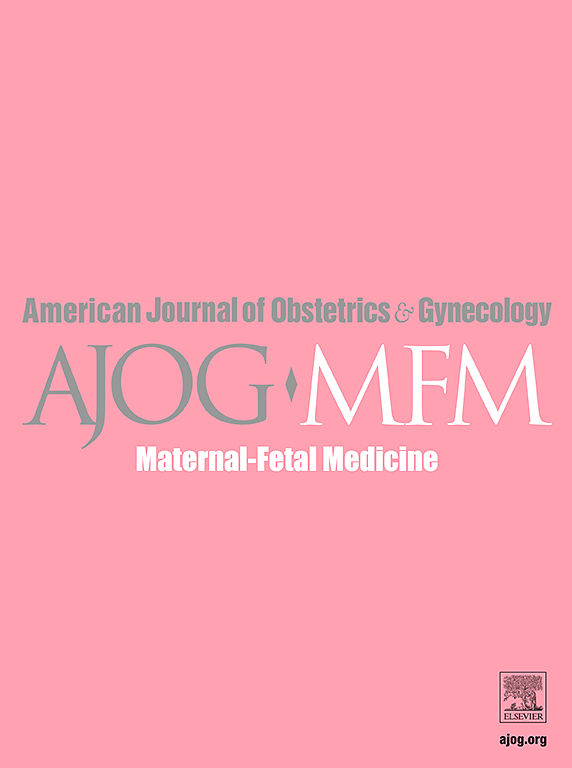Aspirin dosage for preeclampsia prophylaxis: an argument for 162-mg dosing
IF 3.8
2区 医学
Q1 OBSTETRICS & GYNECOLOGY
American Journal of Obstetrics & Gynecology Mfm
Pub Date : 2025-03-01
DOI:10.1016/j.ajogmf.2025.101620
引用次数: 0
Abstract
The optimal aspirin dose for preeclampsia prevention remains controversial, with international guidelines lacking consensus on the most effective regimen. Aspirin is a proven intervention for reducing the risk of preeclampsia, particularly when initiated early in pregnancy. Its benefits stem from the selective inhibition of cyclooxygenase-1 (COX-1), reducing thromboxane A2 synthesis while preserving prostacyclin production, thereby restoring the vascular balance essential for placental health. A dose-response relationship has been established, with doses ≥100 mg showing significantly greater efficacy than lower doses. Furthermore, aspirin's pharmacological effects remain highly specific to COX-1 at the 162 mg dose, minimizing concerns about broader prostaglandin inhibition.
Emerging evidence suggests that certain patient factors, such as altered pharmacokinetics during pregnancy or obesity, may reduce aspirin's effectiveness at lower doses (e.g., 81 mg). In these studies, aspirin resistance was successfully overcome with a 162 mg dose. While concerns regarding safety at this dose have been raised, contemporary randomized controlled trials utilizing a 150 mg dose have shown no increase in adverse effects compared to placebo. As such, current evidence increasingly supports 162 mg as the optimal dose for preeclampsia prevention, offering greater effectiveness than the commonly used 81 mg dose, without significant evidence of increased risk.
阿司匹林预防子痫前期的剂量:对162毫克剂量的争论。
预防先兆子痫的最佳阿司匹林剂量仍然存在争议,国际指南对最有效的方案缺乏共识。阿司匹林是一种经证实的干预措施,可降低先兆子痫的风险,特别是在怀孕早期开始服用时。其益处源于选择性抑制环氧化酶-1 (COX-1),减少血栓素A2的合成,同时保持前列腺素的产生,从而恢复胎盘健康所必需的血管平衡。剂量-反应关系已经建立,剂量≥100mg的疗效明显高于低剂量。此外,阿司匹林对COX-1的药理学作用在162mg剂量下仍然是高度特异性的,最大限度地减少了对前列腺素广泛抑制的担忧。新出现的证据表明,某些患者因素,如怀孕期间药代动力学改变或肥胖,可能会降低较低剂量(如81毫克)阿司匹林的有效性。在这些研究中,用162毫克剂量成功克服了阿司匹林耐药性。虽然对该剂量安全性的担忧有所提高,但使用150mg剂量的当代随机对照试验显示,与安慰剂相比,不良反应没有增加。因此,目前的证据越来越多地支持162毫克是预防子痫前期的最佳剂量,比常用的81毫克剂量更有效,没有明显的证据表明风险增加。
本文章由计算机程序翻译,如有差异,请以英文原文为准。
求助全文
约1分钟内获得全文
求助全文
来源期刊

American Journal of Obstetrics & Gynecology Mfm
Medicine-Medicine (all)
CiteScore
7.40
自引率
3.20%
发文量
254
审稿时长
40 days
期刊介绍:
The American Journal of Obstetrics and Gynecology (AJOG) is a highly esteemed publication with two companion titles. One of these is the American Journal of Obstetrics and Gynecology Maternal-Fetal Medicine (AJOG MFM), which is dedicated to the latest research in the field of maternal-fetal medicine, specifically concerning high-risk pregnancies. The journal encompasses a wide range of topics, including:
Maternal Complications: It addresses significant studies that have the potential to change clinical practice regarding complications faced by pregnant women.
Fetal Complications: The journal covers prenatal diagnosis, ultrasound, and genetic issues related to the fetus, providing insights into the management and care of fetal health.
Prenatal Care: It discusses the best practices in prenatal care to ensure the health and well-being of both the mother and the unborn child.
Intrapartum Care: It provides guidance on the care provided during the childbirth process, which is critical for the safety of both mother and baby.
Postpartum Issues: The journal also tackles issues that arise after childbirth, focusing on the postpartum period and its implications for maternal health. AJOG MFM serves as a reliable forum for peer-reviewed research, with a preference for randomized trials and meta-analyses. The goal is to equip researchers and clinicians with the most current information and evidence-based strategies to effectively manage high-risk pregnancies and to provide the best possible care for mothers and their unborn children.
 求助内容:
求助内容: 应助结果提醒方式:
应助结果提醒方式:


